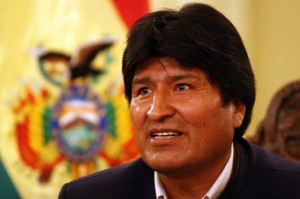Bolivia enshrines natural world’s rights with equal status for Mother Earth
Preyed upon by a corrupt, timid, unimaginative and often criminal leadership beholden to those who precisely create the problems besieging the world, we in the US only wish we had leaders like Evo Morales.
Law of Mother Earth expected to prompt radical new conservation and social measures in South American nation { VIDEO )
- By John Vidal in La Paz | guardian.co.uk, Sunday 10 April 2011 18.17 BST | Article history
John Vidal reports from La Paz where Bolivians are living with the effects of climate change every day Link to this video
conservation and social measures to reduce pollution and control industry.
 The law, which is part of a complete restructuring of the Bolivian legal system following a change of constitution in 2009, has been heavily influenced by a resurgent indigenous Andean spiritual world view which places the environment and the earth deity known as the Pachamama at the centre of all life. Humans are considered equal to all other entities.
The law, which is part of a complete restructuring of the Bolivian legal system following a change of constitution in 2009, has been heavily influenced by a resurgent indigenous Andean spiritual world view which places the environment and the earth deity known as the Pachamama at the centre of all life. Humans are considered equal to all other entities.
But the abstract new laws are not expected to stop industry in its tracks. While it is not clear yet what actual protection the new rights will give in court to bugs, insects and ecosystems, the government is expected to establish a ministry of mother earth and to appoint an ombudsman. It is also committed to giving communities new legal powers to monitor and control polluting industries.
climate change. “Our grandparents taught us that we belong to a big family of plants and animals. We believe that everything in the planet forms part of a big family. We indigenous people can contribute to solving the energy, climate, food and financial crises with our values,” he said.
In the indigenous philosophy, the Pachamama is a living being.
Coping with climate change
Bolivia is struggling to cope with rising temperatures, melting glaciers and more extreme weather events including more frequent floods, droughts, frosts and mudslides.
Research by glaciologist Edson Ramirez of San Andres University in the capital city, La Paz, suggests temperatures have been rising steadily for 60 years and started to accelerate in 1979. They are now on course to rise a further 3.5-4C over the next 100 years. This would turn much of Bolivia into a desert.
Most glaciers below 5,000m are expected to disappear completely within 20 years, leaving Bolivia with a much smaller ice cap. Scientists say this will lead to a crisis in farming and water shortages in cities such as La Paz and El Alto.
